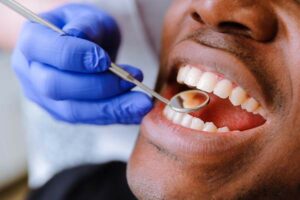The technical name for a dental cleaning is prophylaxis. This is a basic preventive procedure that must be done with some regularity in order to ensure a good oral hygiene. It consists of removing the tartar and plaque accumulated around and between your teeth and beneath the gumline. Regular cleanings, or scalings, can also prevent many diseases and save you thousands of dollars in treatment. In spite of this, many are afraid of the cleaning appointment. If you are one of these, here is all you need to know.
As a new patient, you will be asked to fill out some forms about your contact information and medical history. The latter is important because medical conditions are sometimes considered risk factors that may require special treatment. For example, patients with coronary stents need previous antibiotic treatment prior to any dental procedure, including a cleaning. Patients with diabetes or heavy smoking habits will require more frequent cleanings than most. Pregnant women cannot have dental x rays. There are many medical situations that may require special attention. Please be sure to specify everything and let the dentist decide what is important.
The next step is the exam. The dentist will go tooth by tooth examining, probing, and taking x rays. Doing so will help him assess if there is anything worth attention. Taking x rays is very important too because doing so allows him to notice and diagnose problems at a very early stage.
Next is the prophylaxis. Using special instruments, the dentist will remove plaque around your teeth and beneath your gums. Some clinics use ultrasonic instruments that through vibrations they can more easily remove the accumulation of tartar. This step can be somewhat uncomfortable and if your gums are not healthy, it is normal to have bleeding. The dentist will then polish your teeth to remove superficial stains and floss.
The prophylaxis is a great preventive procedure. Calculus is essentially a hardened accumulation of bacteria. These bacteria start eating away the tooth enamel and begin the formation of a cavity, which is progressive decay. This is a process that does not involve any pain at an early stage and is hard to notice without x-rays. When you start having sensitivity or discomfort, it means the decay has reached the nerve, the life of the tooth. At this point, the damage is irreversible and the nerve must be removed through a root canal treatment and protected through a crown. Dentists recommend a cleaning twice a year and a general exam with x rays at least once. However, patients with high-risk health conditions may require more frequent visits. Doing so will help detect and treat problems when they are still manageable.
Remember that keeping oral hygiene is a daily duty. It is very important to brush your teeth three times a day and floss at least once. Mouthwashes and water irrigators can also help reach complicated areas. Even if you wear dentures or partials, it is important to keep everything as clean as possible from home.
The best way to save money in dentistry is to prevent. Please do not hesitate to contact us with any questions regarding daily and professional oral hygiene.




